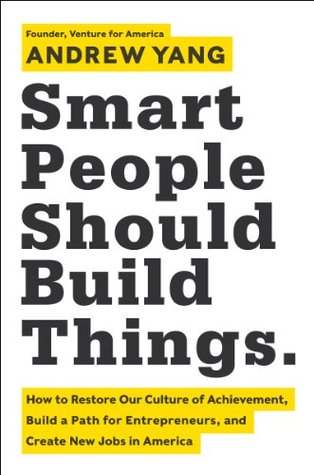More on this book
Community
Kindle Notes & Highlights
by
Andrew Yang
Read between
August 14 - August 16, 2019
We’ve got a problem: our smart people are doing the wrong things.
We need to get our smart people building things (again).
When I was younger, I subscribed to a general view of our educational system that goes something like this: If you study hard and do well in high school, you’ll get into a good college. Where you go to college is very important. Then, if you do well in college, perhaps you’ll go on to law school or med school, or maybe academia if you’re an intellectual sort. In any case, if you’re smart and work hard, you’ll wind up with a good job.
Ambitious college students have no real idea what to do upon graduation, but they’re trained to seek the “next level.” Many apply to law school, grad school, or even medical school because of a vague notion of status and progress rather than a genuine desire or natural fit.
The best way to become an entrepreneur is to learn from a more experienced leader as he or she builds a company.
If you graduate from a national university, there’s a very good chance that you’re going to become a banker, lawyer, consultant, or doctor, and the odds are high that you’re going to pursue one of these professions in New York, Boston, San Francisco, Los Angeles, Chicago, or Washington, DC, regardless of where you originally grew up.
I showed up at Brown planning on getting a degree in English, but after a semester of reading Moll Flanders I switched to economics and political science.
You can go to any corporate law firm and see dozens of people whose satisfaction with their jobs is below average.
Unfortunately, hardworking, academically gifted young people are kind of lazy when it comes to determining direction.
the allocation of talent is a zero-sum game. If the academically gifted are funneled in higher numbers toward finance and consulting, then lesser numbers are going into other areas, such as the operation of companies, startups, and early-stage enterprises.
It’s just human nature. Your expenses grow to match your income. As the decades pass and you realize that no, you’re not going to save the world, the money becomes a more and more important part of the justification. And when you have kids, you’re stuck; it’s much easier to deprive yourself of money (and what it buys) than to deprive your children of money.
The new highest use of a PhD in biology is not to be in the lab; it is to conduct analyses of large drug companies.
law school and briefly practicing law rewired my brain. I’m more structured and detail-oriented than I would have been.
it’s a relatively narrow band of opportunities that will pay you at the same level as your current job. It’s harder to take on the struggle when there’s another path waiting with a bag of money.
A job is more than a job—it’s your car, how you dress, where you live, the relationships you have, and many other things.
It’s unrealistic to think that one can adopt a certain lifestyle for several years and then make an abrupt change without having to make other significant adjustments.
It’s a lot easier to take risks if you’re part of a group whose members will look out for each other.
In 2013, law school applications are projected to be down to about 54,000 from a high of 98,700 in 2004.10 That’s a dramatic decrease of 45 percent.
Bloomberg Businessweek has projected a surplus of 176,000 unemployed or underemployed law school graduates by 2020.13
There is a common and persistent belief out there that entrepreneurship is about creativity, that it’s about having a great idea. But it’s not, really. Entrepreneurship isn’t about creativity. It’s about organization building—which, in turn, is about people.
People get irrationally possessive and touchy about free gift bags.
I was Asian Santa Claus for a day.
many of the people I meet who are young, highly educated, and from good families are among the most risk-averse.
We need more intelligent risk takers and value creators who see their communities reflected in the work they do.
It’s a lot easier to get a job than to start a business. Expecting unemployed people to whip up jobs for themselves, even if one were to supply support, training, and infrastructure, is an unrealistic proposition most of the time.
The issue with nonprofits is that they tend to be small and have difficulty growing.
statistically, a nonprofit that just avoids shrinking is actually performing above average.
My career is a choice that indicates my values.
I will act with integrity in all things.


